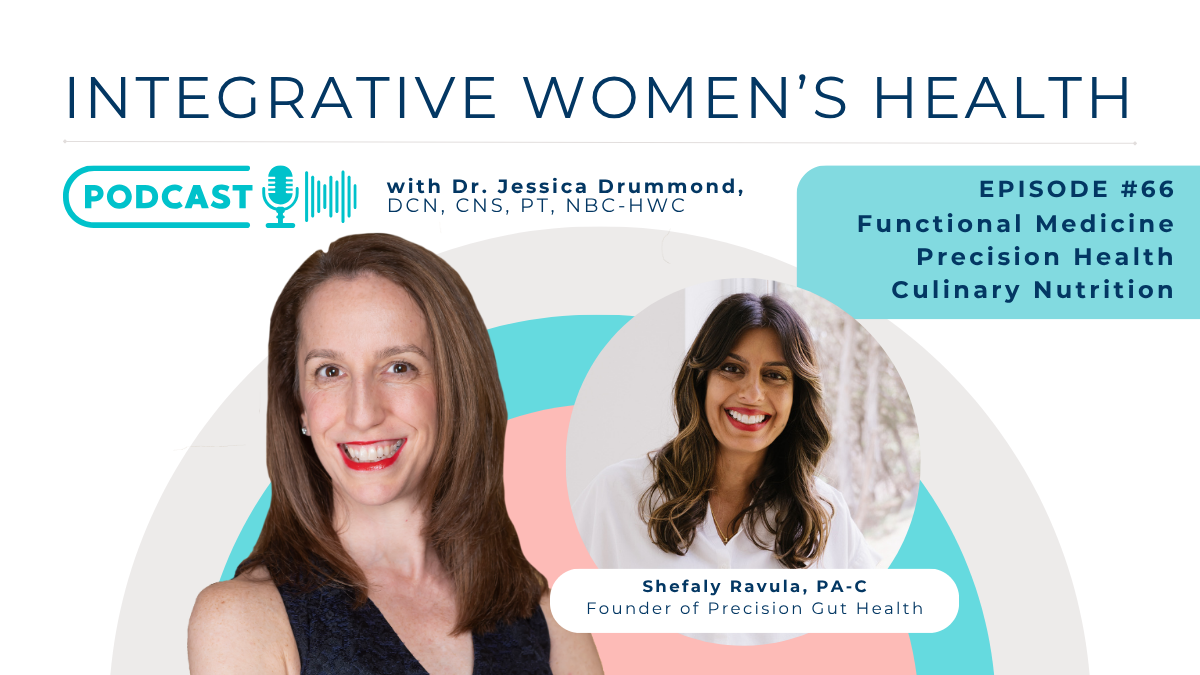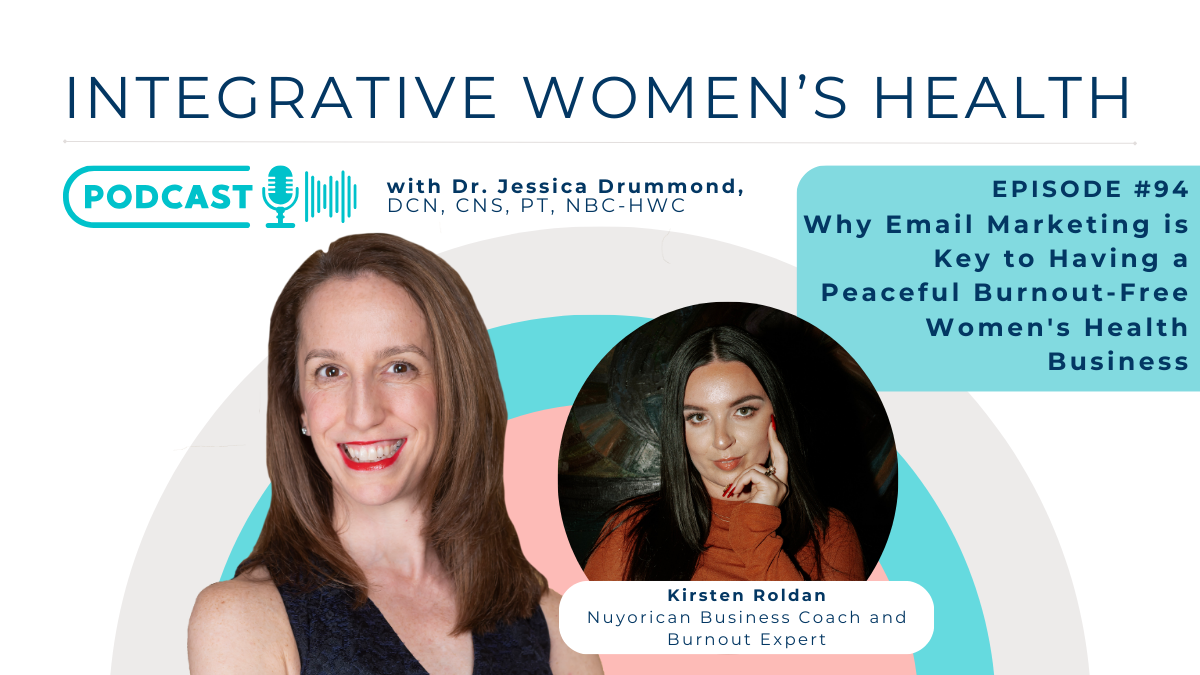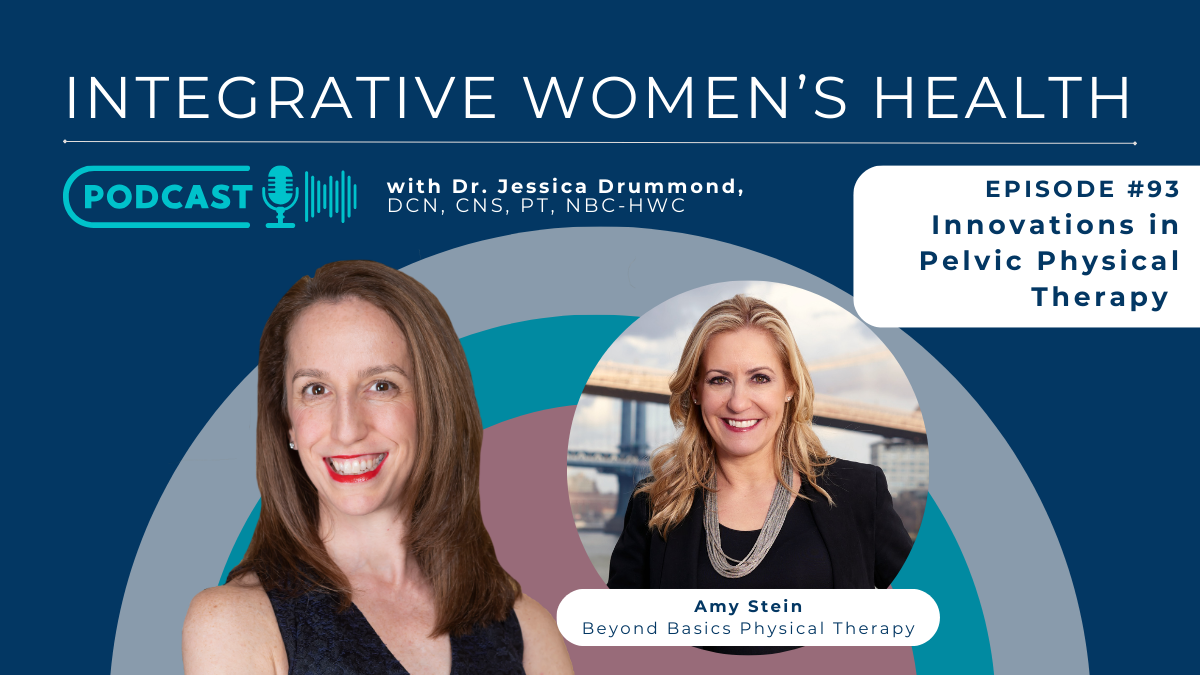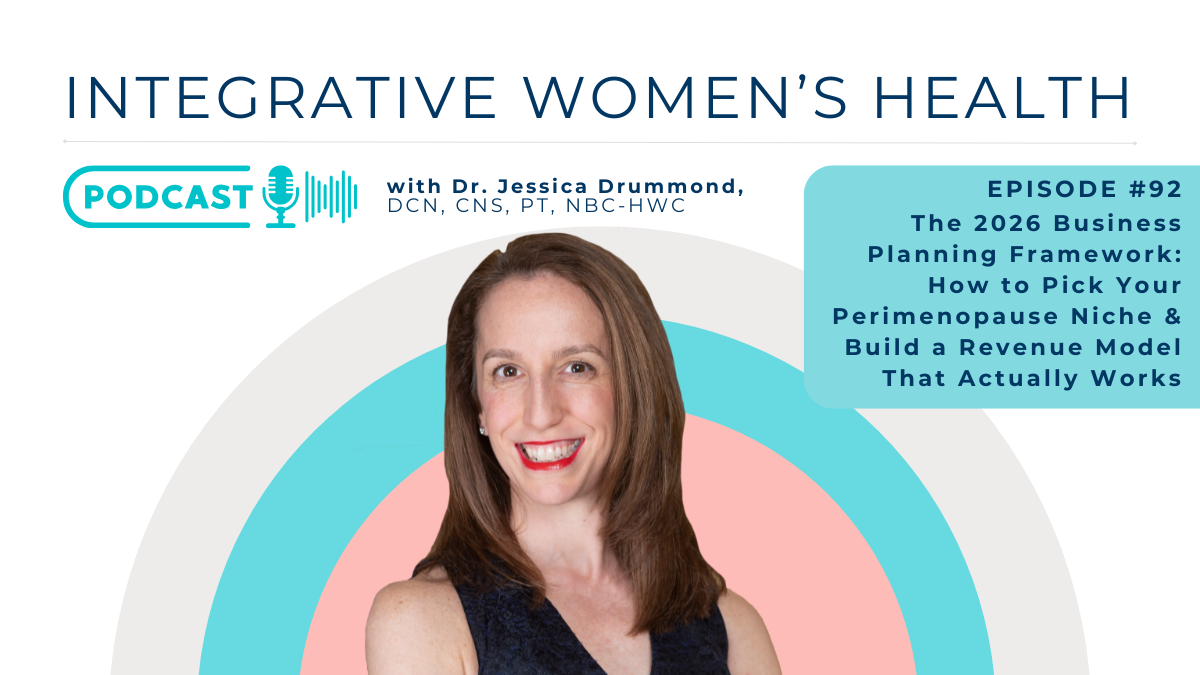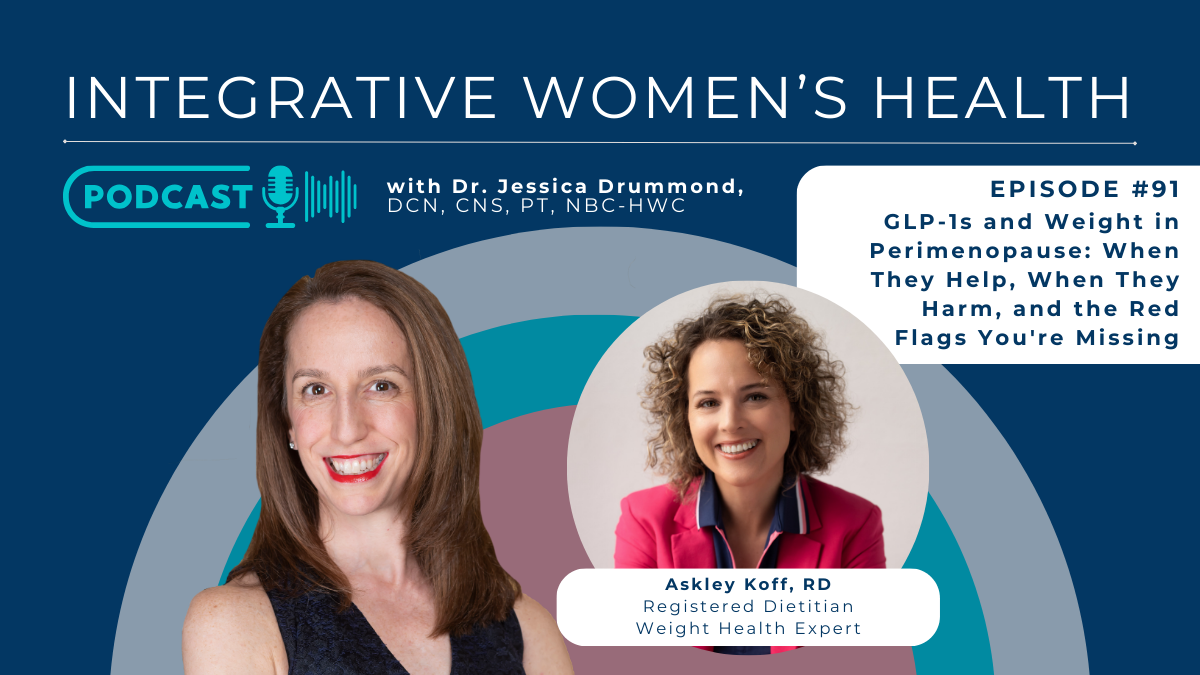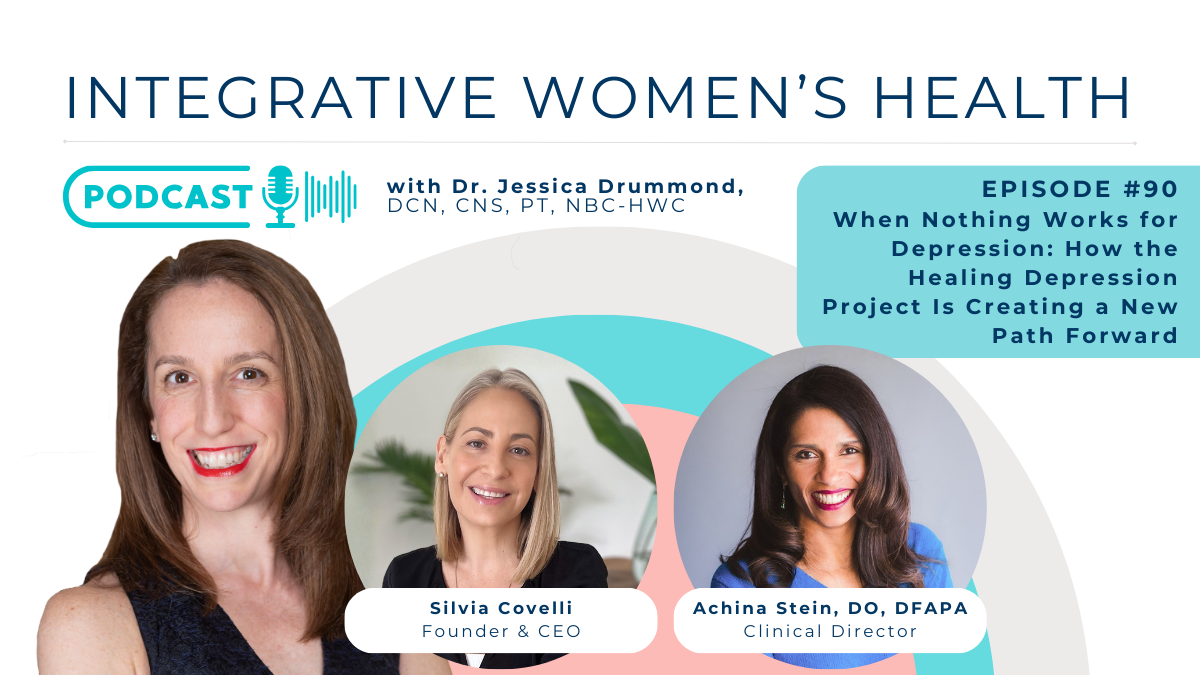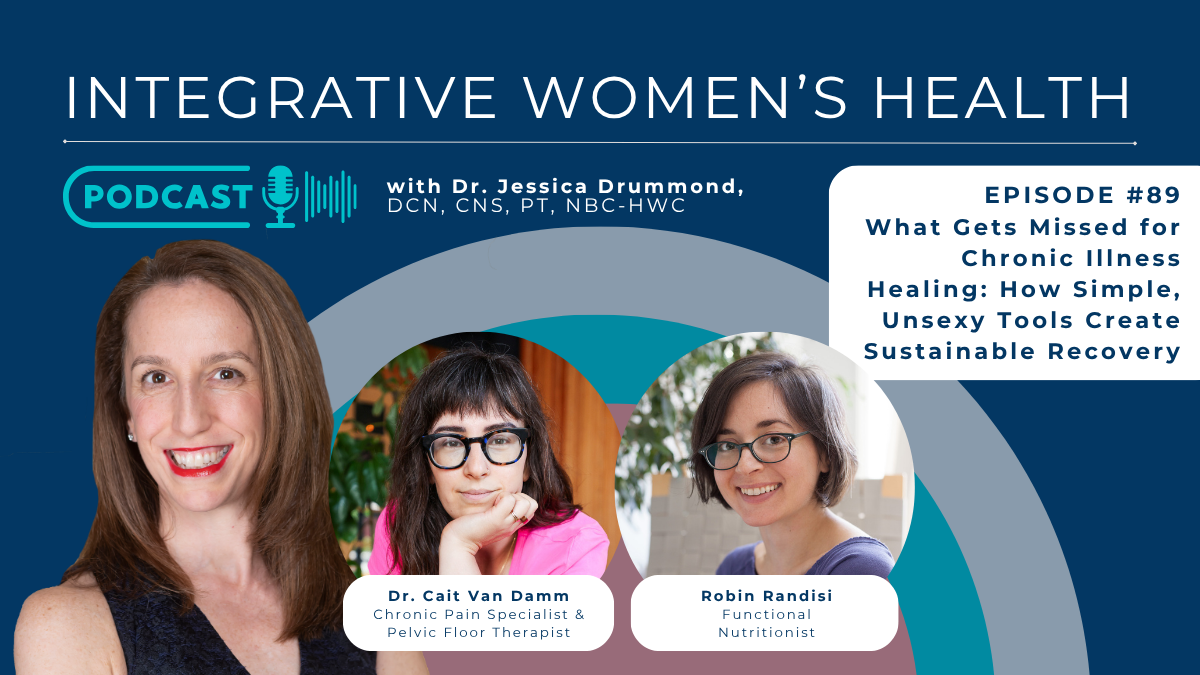Follow Us for Free:
About the episode
“Until we address our entire environment and culture, I think we’re going to keep seeing complex chronic illnesses on the rise.” – Shefaly Ravula
Overall health begins in the gut, and many of our clients dealing with endometriosis and chronic pelvic pain also struggle with gut health challenges that can significantly impact their quality of life. Optimizing their gut health requires us to expand our focus beyond diet and take a root cause approach that explores emotional and physiological factors, like nervous system regulation, environmental toxins, and movement.
As health coaches, we’re in the best position to help our clients navigate their health challenges with a whole-body approach. We can empower patients in ways conventional GI often misses, like reconnecting with food and transforming it from a source of fear into a source of joy and nourishment. Shifts like this not only result in better nutrition but also support the nervous system and nurture the emotional aspects essential for long-term healing.
Today, I’m excited to introduce you to Shefaly Ravula, a physician assistant specializing in gut health. For those of us in women’s pelvic health, it’s important for us to connect with colleagues in GI health, like Shefaly, who has a unique approach that integrates her conventional background with functional medicine, culinary medicine, and herbal medicine.
In this conversation, Shefaly and I discuss the critical link between gut health and overall health, the overlap for many clients between conditions like endometriosis and gut imbalances, Shefaly’s journey into functional medicine, why a personalized approach to gut healing is crucial, the importance of nutrition and stress management, why a positive relationship with food matters, strategies for combining medical, emotional, and lifestyle factors to achieve overall wellness, and more.
Enjoy the episode, and let’s innovate and integrate together!
About Shefaly Ravula, PA-C
Shefaly Ravula, PA-C, is the visionary founder of Precision Gut Health, a virtual telehealth practice on a mission to unlock the secrets of gut health, nutrition and longevity. At the heart of her practice lies a powerful fusion of functional medicine, culinary nutrition, and a profound commitment to digestive and metabolic health optimization. Using a deeply individualized approach, she is dedicated to guiding patients towards a future where gut health and longevity are intricately entwined—and where vibrant health is not just a destination but a lifelong journey.
With a distinguished background in conventional gastroenterology, Shefaly has spent years unraveling the complexities of the human gut. As a cooking instructor and nutrition coach, she seamlessly integrates the art of culinary expertise into her practice. She believes that the path to longevity and vitality begins with understanding the intricate connection between what we eat and how we age.
Shefaly’s work embodies the convergence of integrative/functional medicine, precision medicine, and the cutting-edge field of nutrigenomics. She is a trailblazer in the concept of ‘food as medicine,’ empowering patients to take control of their health destinies.
In addition to her ground-breaking work, Shefaly founded the Food-as-Medicine Academy, a virtual cooking academy that not only imparts nutrition knowledge but also equips individuals with the tools to apply it effectively in the kitchen. Through this academy, individuals gain a profound understanding of how the foods they consume impact their gut health and longevity.
Shefaly’s culinary expertise extends beyond recipes; it’s a key component of her holistic approach to health. By teaching the art of cooking with a focus on gut-friendly, longevity-promoting ingredients, she empowers participants to make informed dietary choices that can transform their well-being. It’s a pivotal step towards a future where gut and metabolic health and longevity are intricately linked, and where each meal becomes a delicious investment in a longer, healthier life.
When she’s not seeing patients, you’ll find Shefaly spending time with her family, cooking and entertaining, reading, playing tennis, or listening to podcasts on nutrition and health.
Highlights
- Shefaly’s journey from conventional GI practice to integrating functional and culinary medicine
- The challenges of restrictive diets and how they impact gut health
- Regulating the nervous system to improve dietary tolerance
- Cooking as a tool for healing
- Strategies for managing clients with complex health issues
- Why identifying the root causes is critical for developing appropriate treatment plans
- The role of functional testing in managing chronic gut conditions
- How Shefaly incorporates cooking education into her practice to empower clients
- How health coaches help facilitate behavior change in clients
- Taking an integrative approach to gut health
- How Shefaly’s SIBO Concierge Program supports clients
- The relationship between SIBO and endometriosis
- Insights from global approaches to SIBO and microbiome health
- The connection between nervous system regulation and improving eating experiences
- Integrating emotional relationships with food into the healing process
Connect with Shefaly Ravula
- Shefaly Ravula’s Food As Medicine Course
- Shefaly Ravula’s Website | PrecisionGutHealth.com
- Shefaly Ravula on Facebook
- Shefaly Ravula on TikTok @PrecisionGutHealth
- Shefaly Ravula on Instagram @PrecisionGutHealth
Mentioned in this episode
Ready to revolutionize your career and grow your practice?
- What is the next step in your career in women’s health and wellness? Start here: https://integrativewomenshealthinstitute.com/start-here/
- Integrative Women’s Health Institute on Instagram | @integrativewomenshealth
- Integrative Women’s Health Institute on YouTube
Learn more about The Integrative Women’s Health Institute’s Programs.
Click here for a full transcript of the episode.
Dr. Jessica Drummond 00:00:03 Hi and welcome to the Integrative Women’s Health Podcast. I’m your host, Doctor Jessica Drummond, and I am so thrilled to have you here as we dive into today’s episode. As always, innovating and integrating in the world of women’s health. And just as a reminder, the content in this podcast episode is no substitute for medical advice, diagnosis, or treatment from your medical or licensed health care team. While myself and many of my guests are licensed healthcare professionals, we are not your licensed healthcare professionals, so you want to get advice on your unique circumstances. Diagnostic recommendations treatment recommendations from your home medical team. Enjoy the episode. Let’s innovate and integrate together. Today. We have a treat for you. I’m excited to introduce you to Shefali Raval. She is a physician assistant located in Austin, Texas, where she has a precision gut health practice. Now, we all know that for our clients struggling with endometriosis and chronic pelvic pain, very often they also struggle with Sibo, CFO, gut motility challenges. And I think it’s really important for those of us working in women’s and pelvic health to also be collaborating and thinking outside of the box with our colleagues in GI health, GI medicine.
Dr. Jessica Drummond 00:01:43 And Shefali has a really unique approach because she comes from a very conventional background, and she still integrates that with functional medicine, culinary medicine, herbal medicine, medicine from other cultures. And while she grew up cooking Indian food with her mother very reluctantly, she has since learned to embrace learning to cook and eat and expand. And like me, she’s a big foodie. So when you want to have really vibrant gut and digestive health, which feeds everything else, right? For those of our clients who are really struggling with eating anything, we know that their nutrition, their nutrient sufficiency, their nutrient absorption, their gut microbiome health, their immune health all suffer. It really is true that overall health begins in the gut. So let’s get into it with Shefali, and we’ll talk about the complexities of our clients with gut and women’s health issues these days that they’re getting worse, not better, because of the intense stress that so many people are under. So take some notes and I’ll see you on the other side for a few next steps.
Dr. Jessica Drummond 00:03:03 Hi and welcome back, everyone to the Integrative Women’s Health Podcast. I’m thrilled to be here with my guest, Shefali Revela. I’m your host, doctor Jessica Drummond, and we’re going to get into bowel health. Shefali is a PA with a specialist in GI function. So obviously you work a lot with Sibo and IBS. So what brought you to that subspecialty? What’s kind of the story behind your career?
Shefaly Ravula 00:03:37 It’s a circuitous path I actually started, believe it or not, out of grad school at a young age, went straight to critical care bone marrow transplant for a few years. So I got a lot of good in-house hospital care, critical care skills, kind of. That was really great. But I didn’t get into gut health in the way that I do it now, except for the fact that I got my next job as a PA in a GI office. So very conventional gastro office work there for years off and on. And then when I did get away from it for a while, I was a stay at home mom for a while, and I started a culinary business.
Shefaly Ravula 00:04:12 Culinary instruction, food writing, that kind of thing. And then I was like, no, I need to bring that back to GI. Obviously, food and gut go hand in hand. And so got training in functional medicine, got a lot of training in nutrition and kind of all at the same time, honestly, there was a lot of overlap. Went back to conventional GI thinking, oh, let me bring what I’ve learned back to the conventional practice. And it just was really difficult to bring in everything that I wanted to in a conventional setting. You know, the culinary piece, the holistic piece, the integrative piece, the functional piece, like hard to do in a 15 minute visit, there is another sort of parallel side of things that really got me into functional medicine and nutrition. And that was my dad’s heart health. And so I ended up learning a lot about cardiometabolic health. Parallel to this. So I started this practice as precision metabolic health. But it was really broad. I was doing a lot of things.
Shefaly Ravula 00:05:08 I was doing a lot of metabolic work and perimenopause. Andrew has got held all of it. And so we narrowed it down to gut health just a year ago, which I still do, all of those other things, but I really hone in on the gut first, and I really like to bridge that gap of conventional gi to this gi. I think there’s a real need for it. So a lot of our referrals are from conventional GI.
Dr. Jessica Drummond 00:05:34 That makes a lot of sense. Similarly, I worked in conventional medicine for a long time and then brought it back and it was well received and it was a little bit easier to do in pelvic health because in pelvic health and physical therapy, people do have more time with their patients, but there’s still too much to do because you’re trying to do manual therapy techniques. And I’m sure the GI physicians were trying to do, you know, procedures and medication management. And one of the things that I’ve noticed through my career, particularly around gut health and nutrition, is like 15, 20 years ago when I was doing this, making simpler changes to nutrition and lifestyle had larger impacts on complex chronic illness.
Dr. Jessica Drummond 00:06:19 And I feel like the illnesses were honestly a little bit less complex in your experience, especially when it comes to gut health. One of the challenges I see is that people are in such restrictive diets. That is actually problematic, but they also really have challenges with expanding those diets, even physiologically. So talk a little bit about, from a gut perspective, how that nutrition and complexity City and digestive health has evolved over your career?
Shefaly Ravula 00:06:52 Well, I think we may have known in our training about the gut brain axis and the, you know, parasympathetic versus sympathetic nervous system and how it puts us into fight or flight mode, even when we’re eating or even thinking about eating in some of these patients. But because that is a little bit more mainstream now, now, I think it’s a little easier to teach it and preach it, and people will listen to it and actually do the things, whereas before it probably sounded like woo woo medicine.
Dr. Jessica Drummond 00:07:23 Yeah. Yeah.
Shefaly Ravula 00:07:25 One of my favorite tools to use is like the Nerva app.
Shefaly Ravula 00:07:29 I kid you not, people come back to me time and time again saying they love it. They find so much value in it and I have no disclosure or anything. I just, you know, it’s just a tool. One tool. It’s not certainly the only tool, but really helps with people understanding that that gut brain access is absolutely palpable. And we need to be thinking about that when we are trying to get away from our food restrictions, because it’s not just, oh, I know I need to do this, let me just go add this. Sometimes some people really struggle with that. Right? So there’s a little PTSD going on.
Dr. Jessica Drummond 00:08:06 Yeah I love that you brought that up. The sort of number one or step one of everything we do is about nervous system regulation, because I think we can be so much more expansive and thus healing with the diets, as people are able to tolerate more fibers, more raw vegetables, more phytonutrients, like, they really can’t tolerate a lot of that if they’re in that restricted and fearful mindset of eating.
Dr. Jessica Drummond 00:08:36 And so even things like fermented food. So I think one of the ways that we can regulate the nervous system, though, is through food. So talk a little bit about your cooking background and how getting people to almost fall in love with enjoying food again versus being afraid of it might be so helpful.
Shefaly Ravula 00:08:56 That is really a good point in the sense of like bringing that joy back in the kitchen, whether it’s just you cooking, or maybe you have a small group. Just this morning we were messaging with our cookbook club, which is one way I find joy in cooking. I mean, I actually grew up not loving cooking. I was kind of forced to do it. It was like expected of me to learn, even on a school night and do a little bit of ten, 15 minutes of helping my mom cook. So I didn’t love it. But then I knew how to do it. I had the tools. So then I expanded my horizons. Instead of just Indian cooking. There was a lot of other cooking when I was an adult, and that’s what kind of had me start enjoying it.
Shefaly Ravula 00:09:38 And then of course, I am kind of a foodie. So when you’re a foodie and you realize, you know, the apple pie out there tastes terrible compared to your homemade apple pie, then you just eat less apple pie because you’re not going to make apple pie all the time. So you become a food snob, and that can be in your favor in some ways, because you might end up eating less processed foods and less of those things. So that’s one thing I think about bringing joy. That’s just one tool. But like, it’s not that easy for people that are suffering in the moment with a true gut diagnosis like IBD, you see Crohn’s, Sibo that’s refractory like really bad acid reflux. It’s not that simple for them to be able to go say, oh yeah, she said, you know, I can go and enjoy myself in the kitchen, but I can’t eat some of the foods that I’m about to cook. So it’s a nuanced approach, and I think those people really need some personalized care, you know, to get to that point.
Dr. Jessica Drummond 00:10:36 Absolutely. And I think even going out to eat, there’s such social connection with food. A lot of my patients do really struggle. It’s a loss. It’s a little bit of grief for a while around kind of not being able to eat just with ease. Right. So if you think about these more complicated clients, because in our community it’s primarily health and wellness professionals. So we’re kind of all dealing with the complexity of the overlap between endometriosis. Sibo resistant Sibo, chronic constipation struggles with motility that feel really refractory. When you sit down with a client with these multiple layers of complexity. What is your sort of methodology? How do you organize that kind of complexity?
Shefaly Ravula 00:11:31 Getting to the root cause and explaining that that can take a long time. Especially Sibo. Not always, but sometimes. And then figuring out the biome and its role. So really I am looking at it from a root cause approach and I’m looking at the local GI effects, but certainly the integrative approach of the whole body and how it’s connected.
Shefaly Ravula 00:11:55 So I guess I don’t know if I can answer that really easily because I think it’s very complicated. So using some kind of root cause analysis methodology, which is a lot of what we are taught, right, in functional medicine and naturopathic medicine, all those types of modalities, we are looking at the root cause and some of the other modalities, like herbal medicine and Chinese medicine and other cultures of the world are looking at maybe root cause as well, but particularly using nature to help and using the body’s ability to do amazing things that it can do. But we live in this toxic soup, and it’s kind of back to what you said in the beginning. Like 20 years ago, we didn’t have as much complex illness and why we have so much now. And I just think that that toxic burden and soup. And when I say toxins, I’m not just talking about chemicals, you know, environmental stress, the standard American diet, all those things sleep, everything keeps adding up. And I don’t know that we’re doing a lot to stop that and to reverse that from happening.
Shefaly Ravula 00:12:56 So I think until we address our entire environment and culture, not only our food, then I think we’re going to keep seeing some of this complex chronic illness arise.
Dr. Jessica Drummond 00:13:08 Yeah, absolutely. I think as you’re saying, the root cause really is the external environment. So as practitioners, we have to help individuals navigate a system that really none of us have that much control over. So individually, I think that’s where some of these tools can be so empowering a little bit to people who feel kind of stuck in this cycle of chronic illness. So one of the tools is cooking, which we talked about, and I’d like to get into that a little more deeply. But also before we do that, do you use much functional testing? Is there anything. You know, are there any particular tests or medications, supplements that tend to be really helpful in some of these more chronic cases?
Shefaly Ravula 00:13:58 Yeah. So if we’re specifically talking about an active gut patient. Yeah. Testing. So there’s a lot of different types of biome testing.
Shefaly Ravula 00:14:07 Doctor Jason teachings are really profound. So are Allison Beckers and the Sibo community and some of these other Sibo specific people, but also microbiome specific. And there can be an overlap. There are a lot of tests out there, let’s just say, and I think cost comes into play here. So we can get a little bit of information from things like GI map Genova, consumers. ET cetera. But then you can get a lot more microbiome information. And some of the other ones, like I’m learning more about tiny health right now. So they are very helpful. They’re not necessarily game changer tests. I would say I also love the genomic testing like 3X4. I love it, but it’s not necessarily a game changer unless you happen to light up in high in methylation pathways or the cellular pathways, because then we’re like, oh, there’s some new things we can actually really do on this patient. And that actually comes into that comment about the environment. The genomics are your genomics. So they’re your genes.
Shefaly Ravula 00:15:07 But again people like to know that because they kind of like to know what they’re dealing with. What are the cards they have. And how can we influence those genes with our lifestyle choices. So not a necessarily like oh my God, black and white, you have this. This is going to be a game changer. But data helps drive behaviors for a lot of personalities, not all personalities. Some personalities are like, give me the data, but I’m not going to. I don’t think I’m going to change my ways because I’m content, you know? But majority of people data is helping them drive some changes. It really is nice to see. Which is why sometimes I do lean on functional test kits, even if they are expensive. Because then you see that, wow, this person was motivated to make that change on, you know, maybe I will do more prebiotic fibers in particularly Foss or inulin or Goss or whatever it might be. Or maybe I will start eating organic foods because of these tests in my blood.
Shefaly Ravula 00:16:06 Or those are a couple of examples. And I do think everyone should get a really good basic chemistry panel, not basic, sorry, functional chemistry panel. Like let’s go beyond what the annual physical gives you because it’s nothing you guys. And so we got to go beyond that. And so we have a nice little package where we do a very full functional chemistry panel. It gives you a lot of great baseline information.
Dr. Jessica Drummond 00:16:31 Especially about things like nutrient absorption. And, you know, generally, I think that can be really helpful for people to see that they’re just not getting enough nutrition in many cases. Yeah. So how do you like to really integrate cooking and teaching people how to cook into your gut work? Because, you know, like you said, not everyone really enjoys cooking and so many people are very busy. But it is so important as a nervous system shift to help people be really empowered with their food.
Shefaly Ravula 00:17:08 Yeah, I meet them where they’re at because I have a pretty detailed intake form that asks them about culinary questions alone, and then nutrition questions alone and what they want to do, where they’re at, what they’re interested in.
Shefaly Ravula 00:17:18 Like we have to meet them where they’re at. So if they’re out about like, hey, I’m going to be eating out four nights a week, period. Can you work with me? Yeah, I can. I’ll tell you. Okay. Eat out. And we’re going to guide you myself in the health coach. On choosing wisely, choosing maybe specific restaurants, choosing certain things on the menu, and then on at home. If you’re not cooking, I’m going to meet you. Where? Yeah, I’ll tell you where to get it delivered from. These are the different things you might want to consider. Do you do Instacart? Do you not do Instacart? What do you get in Instacart? There’s all kinds of amazing meal planning resources out there that are not just restricted to a meal delivery kit. Right. There’s there’s a lot out there. So I just meet them where they’re out there. But if they are, you know, somewhat interested in home cooking and they want to get better at it.
Shefaly Ravula 00:18:09 We have a food as medicine academy. That’s part of our practice that all the patients in the practice get access to. People really love that because it’s there. What it’s there for is like, here you have access to this, but in your one on one sessions with me, I tell you which ones to go listen to, or I’d give you the cliff notes if there’s time for it. You know, a I would say common ones that I see people benefit from are reading labels. Like reading labels is so key and it won’t take long. Maybe get someone like me to take you to the grocery store. Do a one hour session or, you know, whatever. A coach that can walk you through reading the labels and then understanding oils and fats and non-dairy milks, and under really understanding the composition of these things. People will always have questions about that. Yeah.
Dr. Jessica Drummond 00:19:00 Yeah. And so you mentioned a few times that you use health coaches in your practice. I would love to learn a little bit more about that.
Shefaly Ravula 00:19:07 Yeah. I kind of was doing it all myself in the beginning. And I really think that coaching is key and instrumental for behavior change. So data and coaching are very, very Great at executing a treatment plan. So basically, maybe it’s a triad. Maybe I’m the treatment plan person. And then there’s the data, which can be like oh, a Dexa body composition scan and testing and a whoop. You know, I wear a hoop or an aura ring or, you know, all that data. You can get overwhelmed with data. So we don’t want to overdo the data. And then that third part of that sort of stool, I think is a health coach helping you with lifestyle modifications, habit coaching, keeping you accountable. I mean, in the pandemic, I had a fitness trainer like a personal trainer because I couldn’t go to the gym in the beginning, right? I found a virtual trainer, and I was really surprised that he told me that he himself had a trainer. And I’m like, oh, you’re a personal trainer and you have your own trainer.
Shefaly Ravula 00:20:13 He’s like, yes, every coach needs a coach. So everybody in these these days needs a coach.
Dr. Jessica Drummond 00:20:20 Yeah, absolutely. I think that’s a really important human element that’s going to be one of the key drivers forward as medicine becomes more technical and more digital. We do need people to hold us accountable, to help us navigate barriers, to change, to navigate that woman who has had chronic bloating and then she now has a newborn, or she has a challenging teenager, like we don’t have total control over our like, just execute step by step. So coaching can be really, really valuable in people actually achieving their goals. So tell us a little bit before we wrap up about your practice, how you work with people, your favorite kinds of clients.
Shefaly Ravula 00:21:09 Oh okay. So we’re at Precision Gut health.com again, bridging the gap between conventional GI and an integrative, more full body systems approach, starting with the gut. And the longer you work with us if you want to. After our initial sort of intense, you know, 4 to 6 month program, we then usually can move on to working on other things like hormones, perimenopause, adrenals.
Shefaly Ravula 00:21:37 Although we talk about stress from the very beginning. And lipids and cholesterol. I do love lipids because of that family history that I talked about. And that’s kind of a little like piece of the pie that I love to always remember. So you can find us at Precision Gut Health on Instagram, TikTok, trying to do a little more consistent social media.
Dr. Jessica Drummond 00:21:58 I know never enough time for all of it.
Shefaly Ravula 00:22:00 Yes. Yes. And we do have a cool new offering that’s a Sibo concierge program. So it’s really like meant for hand-holding through your Sibo process and Sibo journey, whether you’re already established And dealing with refractory recurrent Sibo, and you’re just hearing a lot of things out there about what to do. That’s the right person for Sibo concierge. Yeah.
Dr. Jessica Drummond 00:22:26 Excellent. Excellent. So those challenging cases you guys really enjoy. And do you see a lot of your Sibo refractory patients actually end up being diagnosed with endometriosis?
Shefaly Ravula 00:22:38 Well I would say no. And you’re not the first person to ask me this because there’s a couple of people I partner with that I send patients to that are manual therapists, etc. different types, and that is what they primarily see.
Shefaly Ravula 00:22:51 But that’s because they do that. And so I sometimes have to look for it and be sure that it’s not there. And so I’m always asking for them to try to see if we need to get pelvic imaging or whatnot, if they don’t have a known diagnosis in some cases. You know, we know I’m tracking their, you know, entire history and seeing oh, okay. Infertility and do things like that, but sometimes it may be hidden.
Dr. Jessica Drummond 00:23:20 Right? So sometimes they may have it, but you don’t know yet. And when you’re seeing them and then other times it’s not related to endo, it’s just challenging Sibo.
Shefaly Ravula 00:23:30 Yeah I mean the root cause list is so long and the common ones are there, but there are a smattering of things like we’ve found, you know, IVIg insufficiency like as being a root cause for some people, certainly a lot of other factors that can compound into the Sibo. So not alone but you know, other factors. So still lots to learn out there. You know lots to that.
Shefaly Ravula 00:23:55 We’re just starting to find out I know D.W. was just this last weekend, which is the big GI International Conference. I didn’t go, but it is a conventional conference. But, you know, it’s nice to see what the conventional space is addressing and doing about Sibo and knowing about CPR as well. Mark Pimentel, you know, is always there and talking about his work. But I also like learning about international communities and what they’re doing for Cebu. And what’s the rest of the world doing about the microbiome besides just the US?
Dr. Jessica Drummond 00:24:27 So yeah, absolutely. Well, thank you so much for being here today. Thank you for those resources and for anyone who’s struggling with Sibo and wants to learn or any kind of chronic digestive health issue and wants to learn more about culinary medicine, you have your program and offering for that. So thank you so much for being here and sharing with us today.
Shefaly Ravula 00:24:50 Thanks so much for having me. I love chatting about all these kinds of things. Could go on and on.
Dr. Jessica Drummond 00:24:55 Oh I know. Absolutely. Excellent. Thank you so much.
Shefaly Ravula 00:24:58 Thank you.
Dr. Jessica Drummond 00:25:04 So Shefali and I agree that our clients are getting more and more complex. And so much of gut and endocrine health immune health link back to the nervous system. I think that was one of the really important themes running through our conversation today, that while people really do need to learn to cook and eat better, that can be easier and much more expansive. When people utilize nervous system regulation strategies that help shift eating from something that’s fearful and restrictive and, you know, carries a lot of challenges and shame and frustration and shifts it to something that’s actually joyful and relaxing and connective. And that can be very, very difficult for our clients with chronic pelvic pain, with endometriosis, with gut health issues, with chronic bloating, no matter the cause. And so one of the things I want you to take right back to your practice this week is to help your clients assess their nutrition, not just in terms of like a food diary or food journal, but thinking, okay, how do I feel about food? What were my messages about food growing up? Do I enjoy cooking? You know what does cooking mean to me? Do I like eating at restaurants? Because we can start anywhere.
Dr. Jessica Drummond 00:26:31 And sometimes it’s about the patience and the support around making eating something that’s more joyful again, and not something that induces fear. The nervous system is so important when it comes to digestive health, because digestive motility is so integrated with digestive health. You really can’t separate the enteric nervous system from the digestive function or the autonomic nervous system from digestive function. So people’s relationship with food is so important. And that’s where coaching comes in. That’s where patience comes in. That’s where this whole experience of healing comes in. Not just necessarily taking a protocol of medications or supplements or herbs or even a nutritional plan, a diet. But how someone relates to food, what cooking means for them, what foods feel nourishing, what foods feel stressful, and how we can help expand people’s enjoyment and social connection when it comes to food without fear, even as they are healing and their systems are very sensitive and in some cases very fragile. You know, when they have things like severe gut dysbiosis or Sibo or yeast overgrowth or motility and neurologic, neurologic issues, these are real physiologic problems that we have to be patient with solving because they make such a difference to people’s quality of life.
Dr. Jessica Drummond 00:28:08 Thanks so much for joining me this week. Take your time with your patients this week as they talk about their gut health. It’s not just about finding the right antibiotic or the right herb. It’s about really integrating the relationship with food into their healing experience. I’ll see you next week. Thank you so much for joining me today for this episode of the Integrative Women’s Health Podcast. Please share this episode with a colleague and if you loved it, hit that subscribe or follow button on your favorite podcast streaming service so that we can do even more to make this podcast better for you and your clients. Let’s innovate and integrate in the world of women’s health.
Join Dr. Jessica Drummond to learn the three key steps to becoming a successful, board-certified Women’s Health Coach who leaves a lasting positive impact on their clients.
Learn how utilizing health coaching skills in your practice is crucial to your success, leaving a lasting impact on your clients, and shifting the paradigm of women’s healthcare.

Dr. Jessica Drummond
Founder & CEO
The Integrative Women’s Health Institute
At the Integrative Women’s Health Institute, we’ve dedicated 17 years to crafting evidence-driven, cutting-edge programs that empower practitioners like you to address the complexities of women’s health.
Dr. Jessica Drummond’s unique approach focuses on functional nutrition, lifestyle medicine, movement therapies, nervous system dysregulation, trauma, and mindset – essential elements often overlooked in traditional health education.
In addition, your training will be fully evidence based, personalized, and nuanced (this is not a cookie cutter approach) in functional nutrition, exercise, recovery, cellular health, and all other lifestyle medicine tools.
You’ll learn to support your clients with cutting edge tools safely and effectively.

